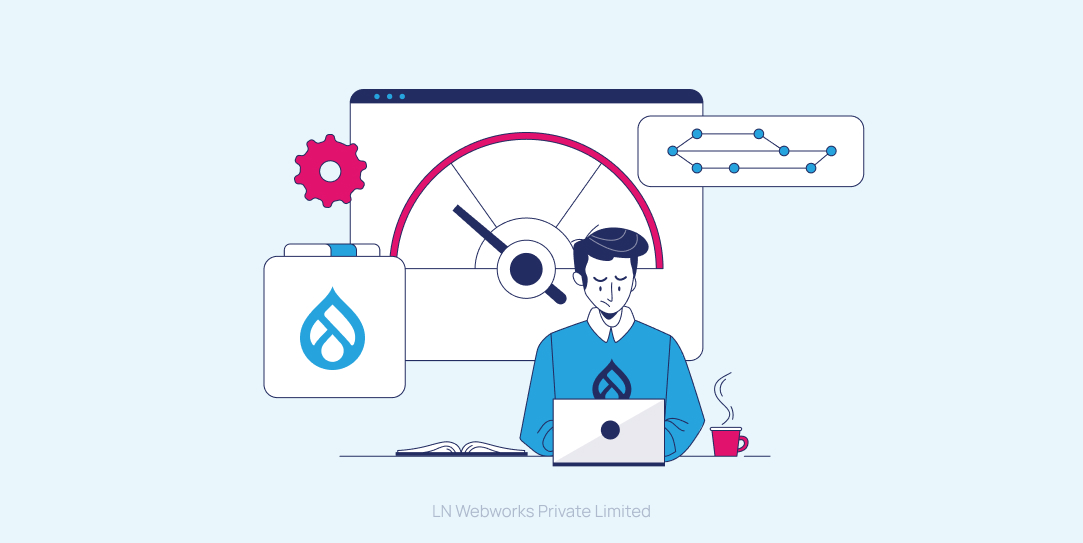Why is My Drupal Website Slow?

Drupal enjoys the stature of being the most advanced content management system (CMS) when it comes to website speed optimization. It has in-built modules and themes to ensure page loading at lightning speed. Many organizations already proclaim with exhilaration that Drupal has made their site nimble enough to offer unparalleled customer experience. In stark contrast, some grumble about their slow website despite relying on Drupal. As a Drupal Consulting Solutions USA we understand that, In this fast-paced world, having a slow website is synonymous with sacrificing your reputation, customers, and search engine ranking. Visitors want sites to load within a blink of an eye, and when that doesn’t happen, they abandon them. Being an internet user yourself, you can understand how frustrating it is to wait for a page to load.
If we go by the statistics, the ideal load time is 1 to 2 seconds, and a 2-second delay in page loading leads to visitor abandonment rates of approximately 87%. The possible implications of such high abandonment rates include loss of your potential sales and precious customer base, and negative publicity which ruins the overall reputation of your company. Quite the contrary, if you possess a nimble website, imagine what an asset to your organization’s reputation it would be. Through your website’s visitors, everyone would hear how phenomenal, cutting-edge, and captivating your site is.
The predictable long-term results of such positive word-of-the-mouth marketing would be skyrocketing sales, profits, reputation, and whatnot! Given that, if you aspire to make your business move in an upward spiral of growth, you cannot afford to possess a slow website. Now, the pressing question is even after relying on a top-notch CMS like Drupal, why do some sites have significant load time? Multitudinous factors contribute to a slow Drupal site. Here, we’ll explore such factors and discuss actionable tactics to overcome them.
7 Reasons Why Your Drupal Website is Slow
If your slow Drupal site is giving you a hard time, the following are some factors that might be responsible for it.
Large images, files, and heavy content
In the words of Cesare Pavese, the Italian writer, “If you want to travel far and fast, travel light”. These words reflect the core of truth and hold true for your site too. A nimble website is the product of lightness. In stark contrast, a content-heavy site with large images and files is bound to be slow. That’s a basic law of nature that applies to technology too.
So, the first factor you need to examine is if your website is content-heavy. In case the answer is yes, it is time for you to think through your priorities deeply. You cannot have both a lightning-fast site and large images and files. Optimizing your image files can serve as an effective and empowering solution for your site’s speed optimization. The rule of thumb is to limit your page size to 500 KB for quick loading. Further, hiring experts for the task of image optimization is also an option if you find it taxing to do it yourself.

Flashy designs and execution of special effects
Drupal is an ingenious CMS with truckloads of flashy designs and special effects to help you develop a captivating website. This gives you the freedom to exercise your choice and incorporate as many effects into your site as you wish. However, design-heavy websites also come at a price: low site loading speed and high bounce rate.
You may grudgingly ask if it means you have to compromise on your design preferences. Gladly, the answer is no. That’s not the case at all. All you require to do is optimize your site’s design. Can’t a website be simple yet captivating? Obviously, it is possible. What’s the point in all the pomp and show if the visitors abandon your site without even having a glimpse of it due to slow page loading? So, the sane choice is to limit the usage of flashy design features. Do not overdo it. Keep it basic, and you won’t suffer even a twinge of regret at your decision in the long run.

A plethora of modules embedded into the site
Drupal’s magnificent modules have made an enormous contribution to making it outperform its competitors. While running a Drupal website, it is easy to get influenced by the charm of the plethora of modules available. Consequently, you may end up enabling multitudinous modules including those you don’t actually need.
No doubt, it can take your site’s functionality to a whole new dimension, but at the same time, it will contribute to slowing down the speed. What do we infer from this? It is imperative to weigh precisely before installing and implementing any Drupal module you come across. If you find yourself locked in a position where you cannot decide what to keep and what not to, don’t feel dejected. You can always contact a Drupal web development company to do the chore for you. Experts are adept at examining the requirements of your website and activating the modules accordingly.

Underlying issues with the server
Loading times are also a function of your server’s effectiveness. If your server is not suited to your website’s functionality and data storage requirements, you are bound to be in trouble. Your site will undoubtedly have slow loading times and make you grumble.
Given that, if your slow site is wreaking havoc on customer experience, your server might be at blame. So, it’s time for you to examine it, and identify if your phenomenal website is suffering because of it. In case, your server falls short of the data storage space required by your site, you can check for unnecessary files or buy more space. Besides, hardware issues can also obstruct your server from delivering peak performance. You can resolve any such issues through regular and meticulous server maintenance.

Sticking to the old version of the CMS
Drupal migrations are considered quite painful as they require a lot of work and involve certain complexities. For instance, you have to rebuild custom themes and remodel architecture. In order to sidestep the taxing process, numerous companies do not upgrade to the CMSs’ latest versions. They stick to their existing versions, which have already become outdated.
If you are one of them, it is crucial to note that it might be the reason why your Drupal site is slow. If you are using outdated modules, themes, and features, then you cannot expect optimal loading speed. In such cases, migrating to the latest version of Drupal is the only key to solving the problem. Besides, it is not essential for you to bear the pangs of Drupal migration yourself. You can always hire a Drupal web development company. This makes the migration process seamless and ensures no loopholes are left to contribute to slow loading times.

Page redirects that get by under your nose
As an active internet user, you might have encountered some page redirects yourself. These often get frustrating as they make you wait to see the desired results. Most of us abandon a website due to page redirects as they slow down the entire process. That said, these hurdles not only slow your website but can also contribute to a significant bounce rate.
While updating your Drupal website, you may have missed removing the old URLs. Consequently, your server will take your visitors through these page redirects before bringing them to the latest versions of the respective pages. This is something you cannot afford as it can produce devastating results for your site in the long run. So, start reaping a prosperous future for your business by resolving all page redirects.
Underlying site hosting issues
Site hosting issues can also impede your site’s optimal performance. If you are relying on shared hosting, your website may suffer from a lack of sufficient data storage capacity. Consequently, all its features and functionalities might not load properly leading to slow performance. In order to resolve the issue, shifting to dedicated hosting is the ultimate choice you can make. Once that happens, you’ll experience a significant reduction in your site’s load time.
Let’s Wrap Up
Drupal is an ingenious software that takes pride in being the most preferred CMS across the globe. Prestigious organizations such as Tesla and General Motors rely on it to power their websites. One of the major reasons why these eminent companies trust Drupal is its ability to supercharge websites for incredible loading speed. As most visitors are too occupied with the humdrum of their lives, they exhibit low levels of patience. If your site takes a significant time to load, they will abandon it, and switch to your competitors.
So, possessing a jet’s speed is imperative for all websites today. Drupal is well-equipped to meet this need. However, in rare cases, due to some underlying factors, the performance of Drupal websites gets compromised. If you are dejected by your slow Drupal site, it is plausible that one of the factors mentioned above might be responsible for it. All you require to do is to identify the factors that apply to your site and then, execute the resolutions provided. If you’re concerned that your Drupal site is running slowly and you’re not sure where to start, consider a Free Drupal Site Audit from LN Webworks, a leading Drupal web development company. The incredible team of experts can fabulously optimize your site’s speed, and equip it for the desired performance. Wish you All the Best.
